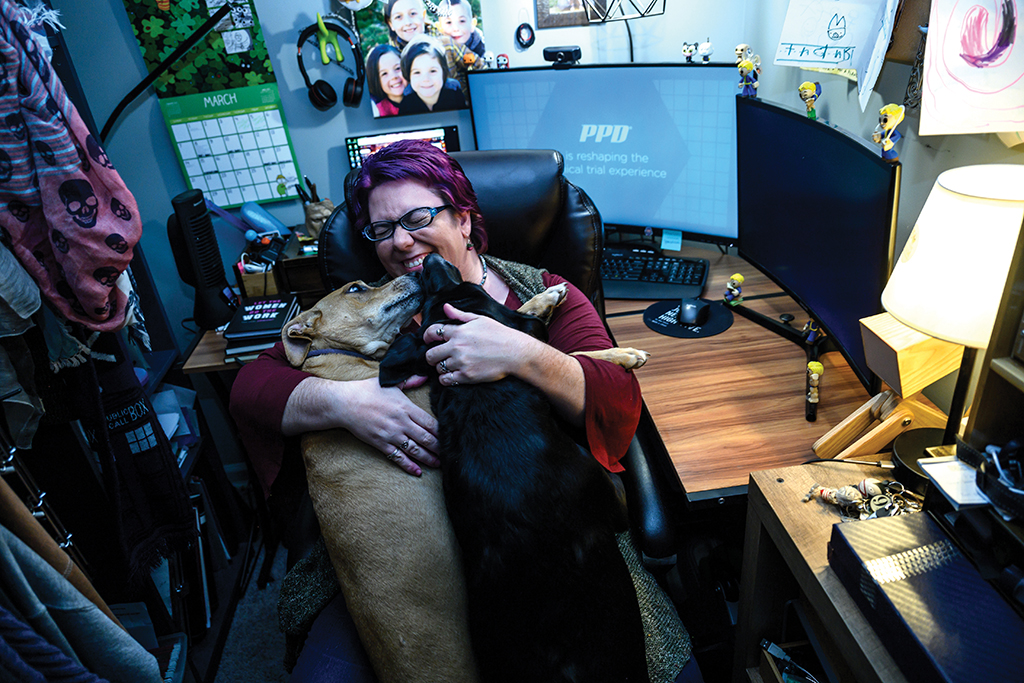Katie Davis Hines ’05 vividly remembers the first clinical trial she managed. It was a respiratory syncytial virus (RSV) study, trying to expand the age range of pre-term infants eligible for insurance coverage for a preventative medication. While reviewing the heartbreaking data about babies dying of the disease, she found herself in the midst of a very personal experience with it. Her own infant son contracted RSV and, at his worst times, needed a breathing machine.
That experience set the stage for her vocation as a senior project manager with late-phase clinical medical trials.
“I never felt so much like I was making a difference,” Hines said. “I see the real-world evidence of what I do.”
The past year has seen a marked increase in public awareness and visibility of Hines’ line of work. Even lay people banter around terms like “late-phase trials” and “90 percent vaccine effectiveness,” perhaps without full understanding of what they mean. In the midst of a pandemic and beyond, Hines’ projects are making a difference for patients with both rare and common diseases around the world.

Hines works for PPD, a global contract research organization. The company is hired by pharmaceutical companies, biotech firms and academic institutions for its expertise in running clinical trials. She coordinates the work of the doctors, data collectors and medical experts in studies as small as 30 patients and as large as 12,000 at as many as 300 medical sites and in multiple countries.
Hines focuses on Phase IIIb and IV clinical trials. She explains that each of the first three phases of trials enroll increasingly more participants with each phase as part of the process of establishing the safety and effectiveness of the products for a specific indication. Phase IV (usually referred to as “late phase”) typically occurs after a drug or device has been approved for use in order to establish long-term safety and efficacy. In the early phases, acute safety is a high priority, while in late phase, a drug’s long-term effects and the impact on the patient’s quality of life can be better assessed, and unforeseen side effects also can be identified. Hines has worked on studies where a particular drug has a follow-up trial for as many as 30 years.
Late-phase trials also include observational studies. For example, if a company wants to better understand the realities of living with a particular disease, a late-phase study would follow patients with that disease. It would gather data on what issues they have and what treatments they are currently implementing. Some data would be collected from healthcare providers, and some would be self-reported by patients.
Hines has worked on studies that have promising results, including studies focusing on muscular dystrophy, early cancer detection and less-invasive testing for viral and bacterial infections. All of her work has the possibility of being life-changing for those affected by the respective diseases.
In this time of COVID-19, Hines has managed two projects that already are contributing to the end of the pandemic. They involved techniques for detecting the virus in a much less invasive and more comfortable process than the standard (and notorious) nasopharyngeal swab. Those testing techniques are now in widespread use.
Almost all new drugs and vaccines are required to have a Post-Authorization Safety Study following approval by the U.S. Food and Drug Administration. These long-term studies look for correlations between the medications/vaccines and any adverse effects that might be linked to them.
Vaccinations have to meet certain safety standards for the general public before they are approved. And the COVID vaccinations that have been approved have met the FDA’s criteria for safety for the populations included in the studies that have occurred to this point.
Katie Davis Hines ‘05
“Vaccinations have to meet certain safety standards for the general public before they are approved,” Hines said. “And the COVID vaccinations that have been approved have met the FDA’s criteria for safety for the populations included in the studies that have occurred to this point. Last-phase research will continue to study those vaccines after the approval stage.”
The purpose of many vaccines is not to eradicate the illness, she added, but to build collective immunity to make the symptoms less life-threatening.
Because of the pandemic, a couple of Hines’ studies have progressed at break-neck speed. Often, a trial takes years. One of her fastest trials in 2020 was completed in eight weeks. That acceleration requires extra hours for the staff. However, even with the urgency of the situation, they maintain rigorous standards and carefully follow all guidelines throughout the process.
Protocols and plans requiring patient understanding/consent and confidentiality are written for each study and examined and approved by the Institutional Review Boards in the U.S., or national ethics committees across the globe. Each participating medical or academic site undergoes a vetting process to ensure it has the capacity to complete the process safely and accurately.

While Hines is passionate about facilitating clinical trials, she didn’t set out to make a career in the medical field. Her undergraduate degree is in theatre and communication; a science background is not required as the studies rely on the expertise of medical experts. She entered the field as a temporary employee when her family moved to Lexington for her husband’s schooling.
But she easily sees the connection between her experiences as a stage manager for theatre productions and clinical trial management. “Coordinating actors as a stage manager is a lot like coordinating doctors for clinical trials,” she quipped. “They have similar temperaments.”
Hines and her family have moved back to Berea in the last couple of years and are glad to be putting down roots. She has reconnected with her alma mater, serving as stage manager for a recent Berea College alumni theatre production.
The family’s ties to the larger community were strengthened during a difficult situation two years ago. Hines’ young daughter went missing on a mountain just outside of town, and thousands of people, from all walks of life, showed up to join in the search. That included other Berea alumni, many of whom she didn’t even know. Her daughter was found, safe and sound.
“I found a community both during and after college that I had never found before. Berea is THAT place, where people want to take care of each other.”


